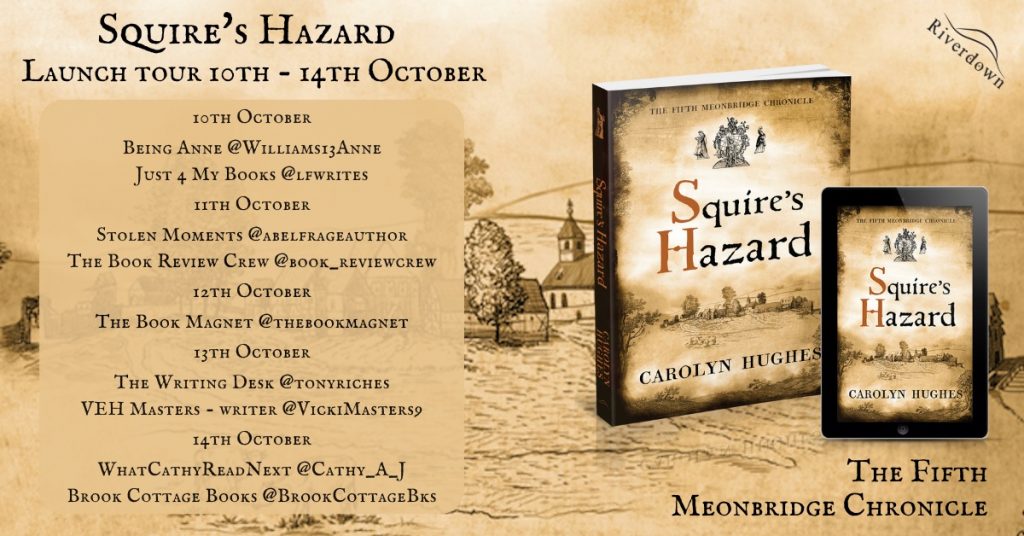Guest Post with Carolyn Hughes
Carolyn Hughes’s next book in the Meonbridge Chronicles is out now. I dived right into Squire’s Hazard and was soon absorbed in the era, the characters and the intrigue: a most enjoyable read.
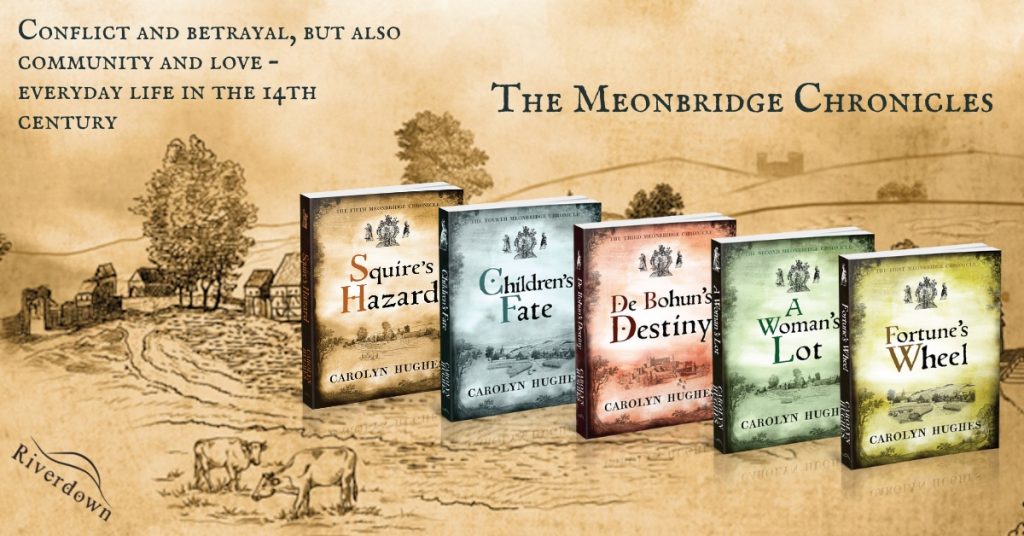
Recently I met up with Carolyn to blether about her newest release, its setting, her research, her writing process and how she used herb lore as part of her story telling. Here’s what she had to say…
Squire’s Hazard is set mid 14th century. It’s refreshing to read historical fiction set in a less commonly written about era. What drew you to that particular time period?
To be honest, it was serendipitous. When I was studying for an MA in Creative Writing in 2009, I had to choose what to write as my creative piece. I wanted a change from the contemporary women’s fiction I’d been writing for the previous few years (none of which is yet published), and opted to write an historical novel. But why the fourteenth century? Well, when I was casting about for inspiration, by chance I came across a fading draft that I’d (hand)written in my twenties, about 10,000 words of a novel set in fourteenth century rural England. The novel’s plot wasn’t up to much, but I was drawn to its period and setting.
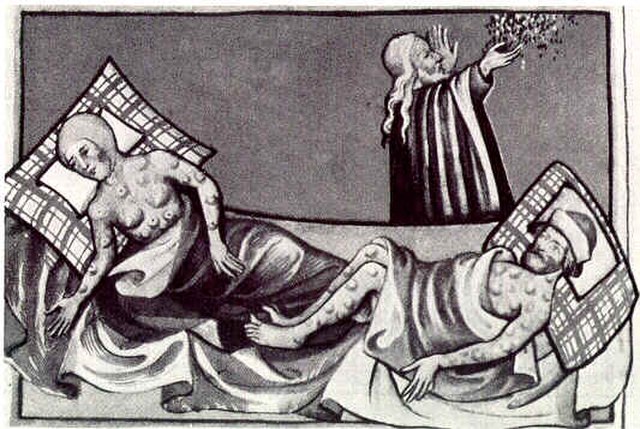
I’d recently been reading some history of the period, specifically about what we call the Black Death. I’d been wondering how people could possibly have coped with such a calamity, when nearly half of everyone in England died. I was interested in the aftermath, the social upheaval that ensued, the difficulties, both practical and emotional, that people would have faced. Such events as these would have meant (as they do in every century) huge changes to people’s lives, at all levels of society. It seemed an excellent subject for a novel and, a few days later, I was drafting an outline for what became Fortune’s Wheel, the first of my Meonbridge Chronicles. I’ve now written another four, with more to come, so, for me, it seems the fourteenth century was a good choice.
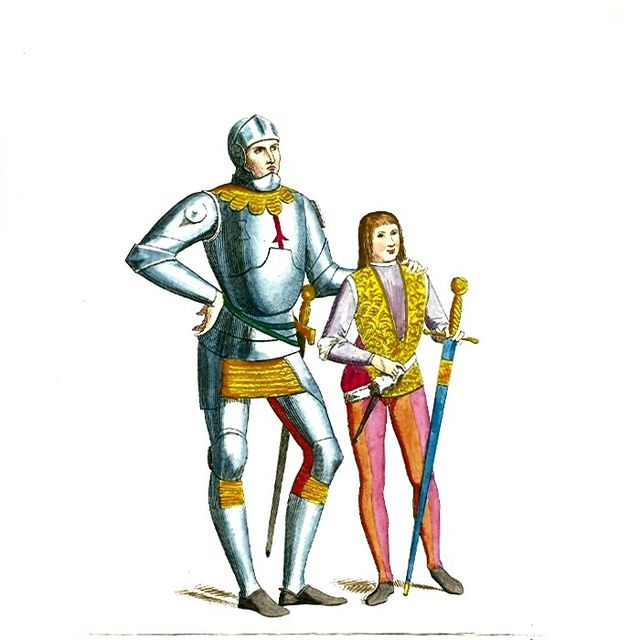
Your main character Dickon is in training to be a squire to a knight and you give us some wonderful detail about what that involves (as well as intrigue). Can you give us some insight into your research process and what catches your interest?
Most of my “research” starts out online, or in one of the very many historical reference books I have acquired over the past few years. I’m mindful of the potential issues with online information, but tend to use what I read there as a starting point to finding authoritative works (books, articles, papers) that I can consult further. That is how I gleaned the information about the training of medieval squires. Sometimes, I will read a snippet that piques my interest and resolve to incorporate it somehow into my story. With the squire’s training, I think the “snippet” might have been about the way younger squires (pages) learned to thrust a lance from aboard a boy-drawn cart or wooden horse.
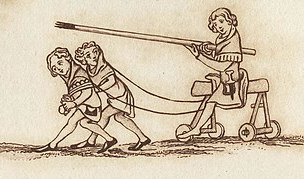
I’d seen contemporary images of such carts and horses before, and found them rather delightful. Where I can, I like to find several sources that say similar (or at least not contradictory) things about whatever it is I want to know, so I can feel reasonably confident it is “true”. I rarely seek access to primary source materials for my research. Generally speaking, my characters and storylines are (almost) entirely fictional, and I haven’t so far found the need to consult such documents (though I don’t rule them out!). My concern is to ensure that the picture I paint is broadly “authentic”, and gives a convincing feel for the period in physical details, behaviour, and mind set.
There’s a fascinating plot point around the use of herbs, and especially wolfsbane. Can you tell us a wee bit about herbs and their uses during the period?
I started looking into the use of wolfsbane, as a possible “device” for havoc in my novel, even though I wasn’t initially sure how it might unfold. As I read, I decided to include something about such plants, even though the havoc didn’t turn out quite as I expected… Herbs were of course used in cooking, to add flavour to a dish, but they were also widely used in remedies. Presumably their nefarious use was less common! I think ordinary folk – women mostly, I imagine – would have known about the use of plants for healing. In another novel, I refer to this domestic therapeutic use of herbs:
… fluffy blue heads of scabious, which Betha said was good for curing itchy skin, and a tiny white flower the old nurse used to treat sore eyes.
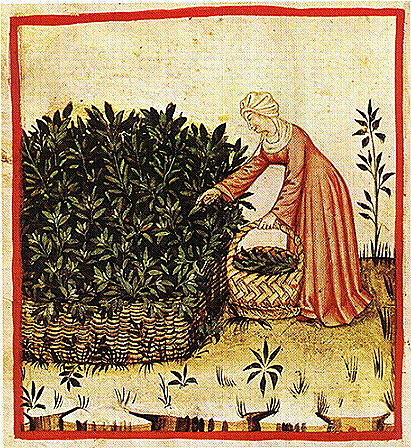
In Squire’s Hazard, the barber-surgeon produces his own salves and lotions using medicinal herbs. He also uses a poisonous plant for good: Atropa belladonna (deadly nightshade) could produce an extract known as “dwale”, used as an anaesthetic when performing surgery. However, I put a discussion of the uses and effects of wolfsbane, and other poisonous plants, into the mouth of a different sort of healer, one who might be referred to as a “wise woman”. She was sought out by ordinary folk for her beneficial herbal remedies, but also for magic charms and potions, which themselves might be used for good or ill. It was such women’s reputation for producing such “magic” that led some folk to consider them witches, and, in Squire’s Hazard, I have my healer living as an outcast, and invariably consulted in secret.
You have a Masters Degree in Creative Writing and a PhD. What were the benefits for you of undertaking these programmes of study?
I’d been writing, in a more or less haphazard way, for most of my adult life. I’d written lots of stories and at least a couple of novels, but felt I needed a “push” to get to the next level of possibly getting something published. I signed up for the Masters in the hope of receiving that push. And it worked, because the result was a completed novel that eventually became Fortune’s Wheel, the first book in my Meonbridge Chronicles series. I learned something about writing a novel, though I’ve learned a great deal more since! But, importantly, it put me on the path to publication.

As for the PhD, I so much enjoyed being at university again (after a break of several decades since my first degree) that I decided to go further. A PhD, of course, is a much more significant undertaking than a Masters. As well as writing another novel (another historical novel set in the fourteenth century, The Nature of Things), I had to research and write a thesis. I like the novel, though I haven’t yet had time to edit it up to publishable standard – but I’ll get there eventually. Writing the thesis, however, was really valuable. I chose to investigate how a writer makes historical fiction feel “authentic”, and finding the answers proved extremely helpful to me in writing both The Nature of Things, and the subsequent Meonbridge Chronicles.
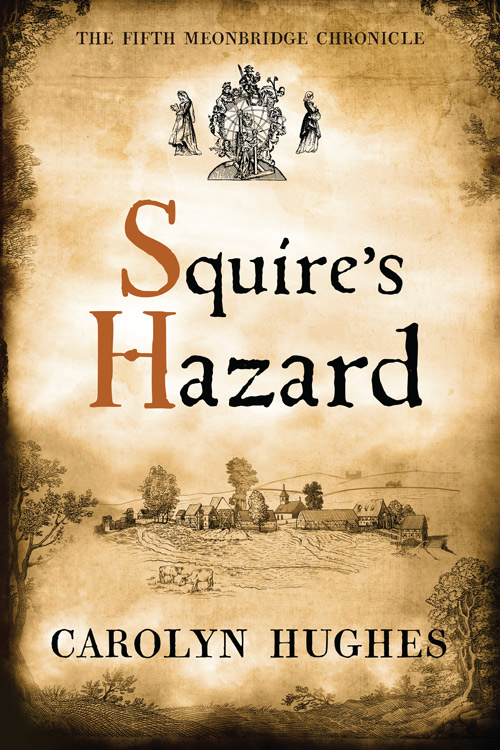
Squire’s Hazard is available now on Amazon UK and Amazon US
How do you overcome the loathing, lust and bitterness threatening you and your family’s honour?
It’s 1363, and in Steyning Castle, Sussex, Dickon de Bohun is enjoying life as a squire in the household of Earl Raoul de Fougère. Or he would be, if it weren’t for Edwin de Courtenay, who’s making his life a misery with his bullying, threatening to expose the truth about Dickon’s birth.
At home in Meonbridge for Christmas, Dickon notices how grown-up his childhood playmate, Libby Fletcher, has become since he last saw her and feels the stirrings of desire. Libby, seeing how different he is too, falls instantly in love. But as a servant to Dickon’s grandmother, Lady Margaret de Bohun, she could surely never be his wife.
Margery Tyler, Libby’s aunt, meeting her niece by chance, learns of her passion for young Dickon. Their conversation rekindles Margery’s long-held rancour against the de Bohuns, whom she blames for all the ills that befell her family, including her own servitude. For years she’s hidden her hunger for revenge, but she can no longer keep her hostility in check.
As the future Lord of Meonbridge, Dickon knows he must rise above de Courtenay’s loathing and intimidation, and get the better of him. And, surely, he must master his lust for Libby, so his own mother’s shocking history is not repeated? Of Margery’s bitterness, however, he has yet to learn…
Beset by the hazards triggered by such powerful and dangerous emotions, can Dickon summon up the courage and resolve to overcome them?
For more information on Carolyn’s books and writing please go to www.carolynhughesauthor.com
Carolyn can also be found on Goodreads
